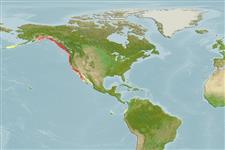Common names from other countries
>
Pleuronectiformes (Flatfishes) >
Pleuronectidae (Righteye flounders) > Pleuronichthyinae
Etymology: Pleuronichthys: Greek, pleura = side, ribe Greek, ichthys = fish (Ref. 45335); decurrens: From the Greek pleuron meaning side, and ichthys meaning fish (Ref. 6885); and from the Latin decurrens, meaning 'running down' (Ref. 27436).
More on authors: Jordan & Gilbert.
Environment: milieu / climate zone / depth range / distribution range
Ökologie
seewasser demersal; tiefenbereich 8 - 533 m (Ref. 6885), usually 20 - ? m (Ref. 27436). Subtropical
Eastern Pacific: Prince William Sound, Alaska to Bahia San Quintin, northern Baja California, Mexico.
Size / Gewicht / Alter
Maturity: Lm ? range ? - ? cm
Max length : 37.0 cm TL Männchen/unbestimmt; (Ref. 2850)
Rückenflossenstacheln (insgesamt): 0; Rückenflossenweichstrahlen (insgesamt): 67-79; Afterflossenstacheln 0; Afterflossenweichstrahlen: 46 - 52; Wirbelzahl: 37 - 39. Dorsal origin far forward at angle of mouth, first 9-12 rays on the blind side. Caudal deep and rounded.
Commonly found on soft bottom (Ref. 2850). Feed on brittle stars and nudibranchs (Ref. 27436). Minimal interest to anglers, usually an incidental catch (Ref. 27436).
Life cycle and mating behavior
Geschlechtsreife | Fortpflanzung | Ablaichen | Eier | Fecundity | Larven
Vinnikov, K.A., R.C. Thomson and T.A. Munroe, 2018. Revised classification of the righteye flounders (Teleostei: Pleuronectidae) based on multilocus phylogeny with complete taxon sampling. Molecular phylogenetics and evolution, 125:147-162. (Ref. 122998)
IUCN Rote Liste Status (Ref. 130435)
CITES (Ref. 128078)
Not Evaluated
Bedrohung für Menschen
Harmless
Nutzung durch Menschen
Fischereien: weniger kommerziell; Sportfisch: ja
Mehr Information
ReferenzenAquakulturAquakultur ProfilZuchtlinienGenetikElectrophoresesVererbbarkeitKrankheitenVerarbeitungMass conversion
Tools
Zusatzinformationen
Download XML
Internet Quellen
Estimates based on models
Preferred temperature (Ref.
115969): 5.7 - 14, mean 8.8 (based on 318 cells).
Phylogenetic diversity index (Ref.
82804): PD
50 = 0.5078 [Uniqueness, from 0.5 = low to 2.0 = high].
Bayesian length-weight: a=0.01660 (0.00676 - 0.04074), b=3.01 (2.80 - 3.22), in cm Total Length, based on LWR estimates for this (Sub)family-body shape (Ref.
93245).
Trophic level (Ref.
69278): 3.9 ±0.55 se; based on food items.
Widerstandsfähigkeit (Ref.
120179): mittel, Verdopplung der Population dauert 1,4 - 4,4 Jahre. (Preliminary K or Fecundity.).
Fishing Vulnerability (Ref.
59153): Low to moderate vulnerability (27 of 100).
Climate Vulnerability (Ref.
125649): Low to moderate vulnerability (27 of 100).
